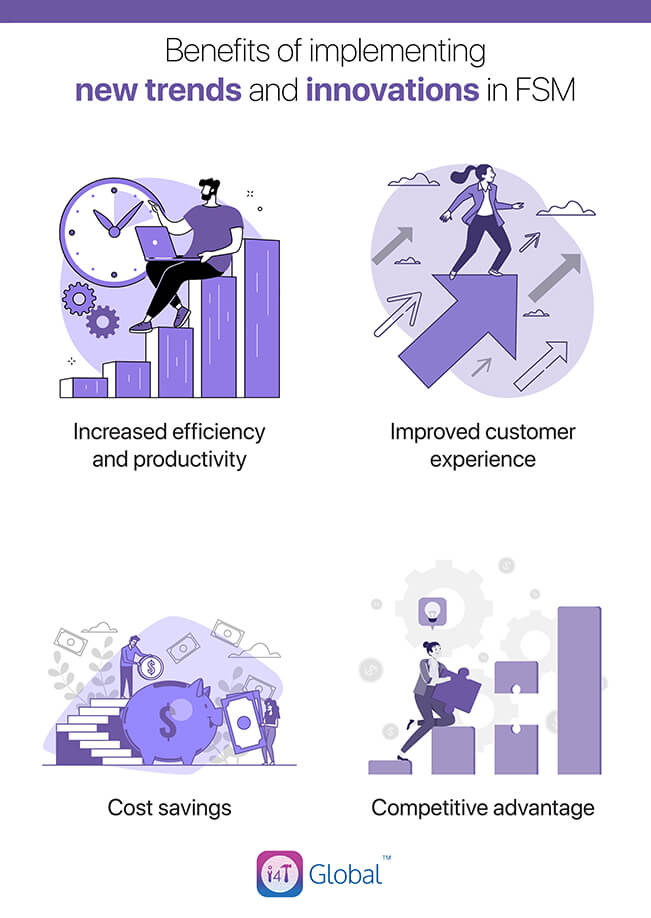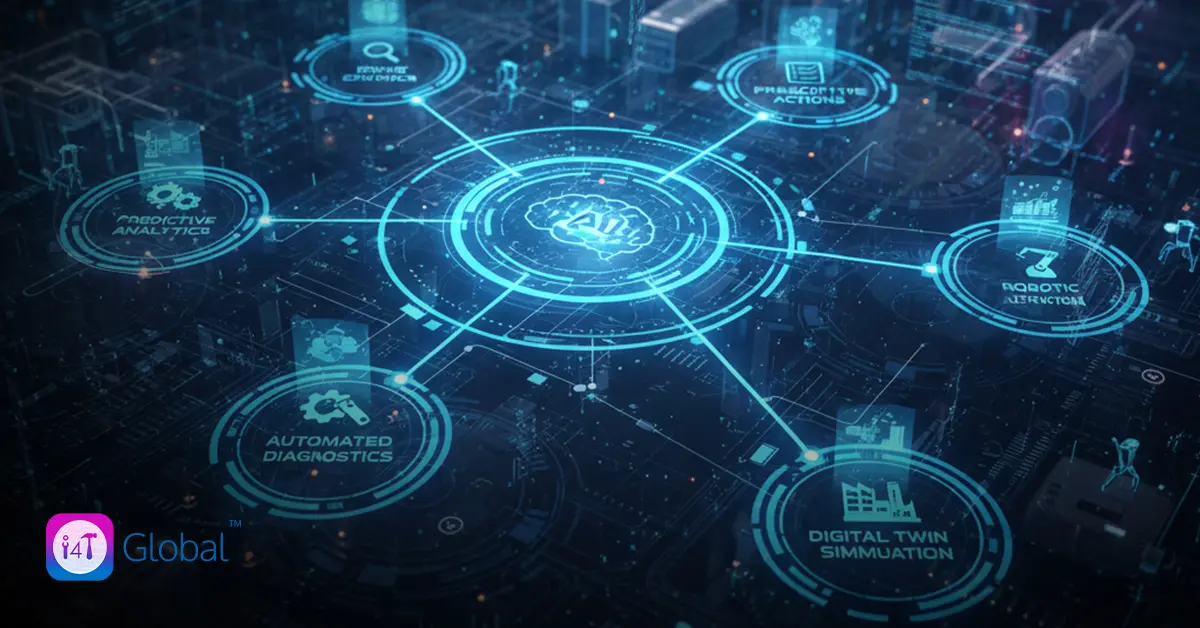Are you ready to conquer the industry with modern field service management innovations? As you know, field service management (FSM) has been a complicated, challenging area. However, with modern technology and innovations, you can streamline your operations quickly and efficiently. This article will explore the top trends in FSM innovations shaping the industry and how you can stay on top of the competition.
Introduction to field service management
What is field service management? It involves managing resources such as technicians, tools, and vehicles to ensure timely and efficient delivery of services. FSM has become a crucial part of businesses that provide services to their customers. Especially, in the industries such as telecommunications, healthcare, and utilities.
Companies that are in the FSM industry must ensure that their resources are utilised efficiently and effectively to meet the evolving demands of their customers.
The importance of staying ahead of the game in FSM
Staying ahead of the game in FSM is crucial to ensure that companies remain competitive and relevant in the market. Companies must keep up with the latest trends and innovations to meet ever-changing customer demands and deliver quality services. By staying ahead of the game, companies can increase their efficiency, reduce costs, improve customer satisfaction, and tackle competition easily.
Top trends in field service management
FSM has been a challenging area for many years. However, the trends have evolved over the years, and now you can manage your business more efficiently. Check out the modern FSM trends in the industry.
Automation and artificial intelligence (AI)
Companies in the FSM industry are leveraging automation and AI technologies to streamline and optimise field service operations. This includes automating repetitive tasks, using machine learning algorithms for predictive analytics, and deploying virtual assistants for customer support.
Mobile technology and the cloud
Mobile devices and cloud-based platforms have revolutionised FSM. This has enabled real-time communication, access to data, and collaboration between field technicians. Mobile apps and cloud-based FSM solutions provide agility, flexibility, and improved efficiency in managing field service tasks.
Predictive maintenance
Predictive maintenance utilises data analytics, IoT sensors, and machine learning algorithms to predict and prevent equipment failures before they occur. FSM systems incorporate predictive maintenance capabilities to schedule proactive maintenance, reduce downtime, and optimise resource allocation.
IoT (Internet of Things)
The IoT plays a significant role in FSM by connecting devices, equipment, and sensors to gather real-time data and enable remote monitoring and diagnostics. IoT integration helps FSM systems to identify issues early, trigger service requests, and improve overall equipment performance.
Customer self-service
Empowering customers with self-service options is becoming increasingly prevalent in FSM. Through online portals, mobile apps, and knowledge bases, customers can schedule service appointments, track job progress, access documentation, and seek assistance without direct involvement from customer service representatives.
Innovations in FSM
Are you adopting modern field service management innovations in your business? These innovations have helped many field service businesses to stay ahead in the game and beat the competition. Check out these modern innovations and adopt them in your business.
AI (Artificial Intelligence)
AI is revolutionising FSM by automating tasks, providing intelligent insights, and enabling predictive analytics. AI-powered FSM solutions can automatically schedule and optimise service appointments, analyse historical data for predictive maintenance, and offer virtual assistants for real-time support and guidance.
Augmented reality (AR)
AR technology transforms FSM by overlaying virtual information onto the physical world, improving technician productivity and accuracy. AR-enabled FSM solutions provide technicians with real-time access to manuals, diagrams, and remote expert support, facilitating complex repairs and reducing downtime.
Wearables
Wearable devices, such as smart glasses or smart watches, enhance FSM by providing hands-free access to critical information and real-time communication. Technicians can use wearables to view work orders, access equipment data, and collaborate with remote experts. This can increase efficiency and enable a more connected field service experience.
Big data and analytics
The organisations in FSM can get valuable insights from vast amounts of field service data by utilising big data and advanced analytics. Organisations can identify trends, optimise resource allocation, and make data-driven decisions by analysing equipment performance, service history, and customer feedback. This would help to improve service quality and customer satisfaction.
Benefits of implementing new trends and innovations in FSM

Implementing new trends and innovations in FSM can have a transformative impact on businesses. Here are some top benefits of adopting modern trends and field service management innovations in your business.
- Increased efficiency and productivity: By leveraging technologies like automation, AI, and IoT, organisations can optimise workflows, automate manual tasks, and improve resource allocation. This helps to streamline the process, improve response times, and increase efficiency and productivity in field service operations.
- Improved customer experience: Innovations in FSM allow organisations to deliver a superior customer experience. Features like real-time updates, self-service portals, and remote assistance would improve response time, enhance transparency, and offer personalised services. This can result in higher customer satisfaction levels.
- Cost savings: Implementing new trends and innovations in FSM can lead to significant cost savings. Automation and predictive maintenance help reduce unplanned downtime and costly repairs. You can optimise resource allocation by deploying technicians efficiently and minimising travel time and expenses. Furthermore, data analytics and insights enable organisations to make informed decisions, optimise inventory levels, and reduce overall operational costs.
- Competitive advantage: Embracing new trends and innovations in FSM provides organisations with a competitive edge. By leveraging advanced technologies, organisations can differentiate themselves from competitors by offering enhanced service levels, faster response times, and innovative solutions. This can help attract new customers, retain existing ones, and strengthen their position in the market.
Challenges and risks of adopting new trends and innovations in FSM
Adopting modern Field Service Management innovations comes with its challenges and risks. You should tackle these challenges to ensure the trends and innovations are successfully adopted. Some of the challenges include:
- Integration with existing systems: Integrating new FSM technologies with existing systems, such as enterprise resource planning (ERP) systems and customer relationship management (CRM) can be complex and challenging. Ensuring seamless data exchange and platform compatibility requires careful planning, customisation, and potentially additional investments.
- Cost of implementation: Implementing new trends and innovations in FSM often involves significant upfront costs. This would include purchasing new software and hardware or even upgrading the infrastructure. Organisations need to assess the financial feasibility of these investments and consider the long-term return on investment (ROI) before committing to implementation.
- Data privacy and security risks: Businesses face data privacy and security risks with the increasing use of FSM data analytics, AI, and cloud-based solutions. As a result protecting customer data, sensitive business information, and intellectual property has become critical. Therefore, it is essential to implement robust security measures, ensure compliance with data protection regulations, and regularly monitor and update security protocols.
- Training and change management: You must train field technicians and staff when introducing new technologies and innovations in FSM to ensure a smooth transition. Resistance to change and lack of user acceptance can pose challenges during the implementation. Organisations should invest in comprehensive training programs and change management strategies to facilitate a smooth transition and maximise the benefits of the new technologies.
- Evolving technology landscape: FSM technologies’ landscape continuously evolves with new trends and innovations. Keeping up with these changes and selecting the right technologies for specific business needs can be challenging. It requires ongoing research, evaluation, and a strategic approach to ensure the chosen technologies align with organisational goals and remain relevant in the long term.
How to stay up-to-date with the latest field service management innovations
Staying up-to-date with the latest trends and innovations in FSM is crucial for companies to remain competitive. Some of the ways to stay up-to-date include:
- Attending industry events such as the FSM Summit can provide companies with insights into FSM’s latest trends and innovations.
- Networking with industry experts can provide companies with valuable insights into FSM’s latest trends and innovations.
- Subscribing to industry publications can inform companies about the latest FSM trends and innovations.
Conclusion
FSM is an essential part of businesses that provide services to their customers.
With FSM's newest ideas and trends, businesses can become more efficient, cut costs, and make customers happier.
By staying up to date with the latest trends and innovations, companies can stay ahead of the competition and stay competitive in the market.
Do you want to learn more about the newest field service management innovations in the industry? Then don’t miss out on this opportunity at the upcoming FSM Summit 2023 in Australia. Register now and get a 15% discount on the Event Pass. Join us for a chance to network with peers in the industry, attend informative sessions, and discover new technologies that can help your business succeed.
FAQs
FSM Summit 2023 is a premier industry event focused on field service management. It brings professionals and experts together to explore FSM’s latest trends, innovations, and best practices. Attending the summit provides valuable insights, networking opportunities, and access to cutting-edge knowledge that can drive success in the field service industry.
Attending FSM Summit 2023 allows professionals to gain firsthand knowledge of the latest trends, innovations, and industry insights experts and practitioners share. They can attend keynote presentations, panel discussions, and interactive sessions that delve into the future of FSM, enabling them to stay ahead of the curve.
FSM trends like AI, automation, and self-service portals enable faster response times, real-time updates, and personalised service. This enhances the customer experience by providing transparency, convenience, and improved communication throughout the service process.
Yes, organisations can customise FSM innovations based on their specific needs. They can choose and integrate technologies that align with their business processes and objectives, allowing for tailored solutions that optimise field service operations.
Organisations can stay updated by researching industry publications, attending conferences and webinars, participating in industry forums, and engaging with technology vendors and experts. Networking and collaboration with other organisations in the field service industry can also provide valuable insights.
Hot off the press!

With our cutting-edge technology and in-depth knowledge of how the Field Service Management sector operates, the i4TGlobal Team loves to share industry insights to help streamline your business processes and generate new leads. We are driven by innovation and are passionate about delivering solutions that are transparent, compliant, efficient and safe for all stakeholders and across all touch points.
Recent articles that may interest you as well..




